The RF Limited UTB-1
The Universal Talk-Back Board is what the name suggests, a talkback PC board that installs into any CB or
10-Meter transceiver and produces adjustable talkback. It’s the first talkback board that incorporates an on-
board audio amp. This allows talkback, which will work on all modes of communication, to be installed in
any radio. This board does require more work for installation than other units, but the clear talkback is
worth it. It doesn’t have a switch to turn it off, but with the talkback volume control fully counter-clockwise,
the talkback level is zero. The on-board amp is a low power amplifier. To use a high power amp would be
too costly and the only accomplishment would be to create louder feedback. The amp is more than
sufficient for talkback purposes. In addition, a higher wattage amplifier would be larger and require more
associated components, requiring a larger PC Board. With all the add-ons and with what’s in some of these
radios already, for example, the Galaxy DX99V, the smaller the talkback board the better.
The UTB-1 kit comes with instructions that will allow anyone with some basic electronics and soldering
experience to install this board easily. There is technical update and a diode included with every board.
This update is for radios that won’t allow the UTB-1 relay to release after a transmission is completed.
These radios hold the TX line down to 8 volts or lower leaving 4 volts or more across the relay. This wasn’t
a problem on the prototype boards, because the original design in used a 5-volt relay and a resistor in
series with relay in the circuit. The relay was changed to a 12-volt unit and the resistor was eliminated
because factory had an abundance of 12-volt relays and at the time, and no one envisioned a problem
using them. However, the issue became clear as soon as techs started to install them and call with
complaints. See the diagrams below for the technical update.
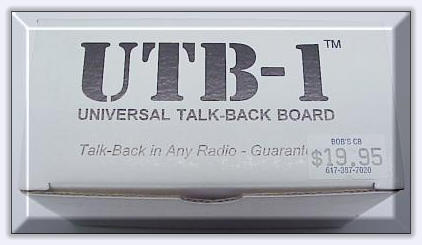
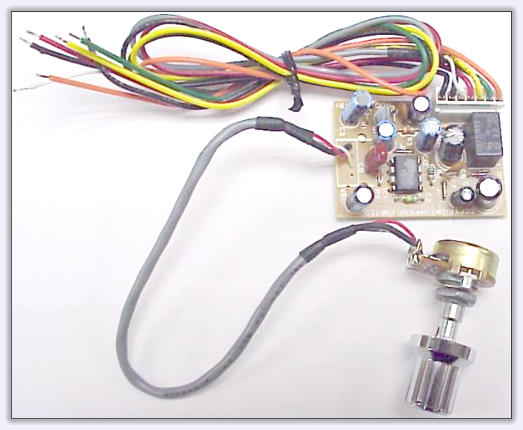
Typical Cobra/Uniden 4 Pin Wiring
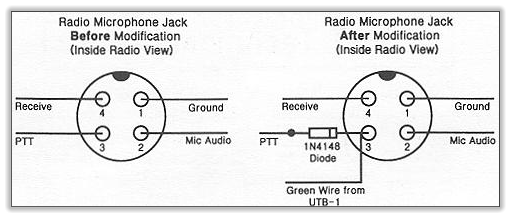
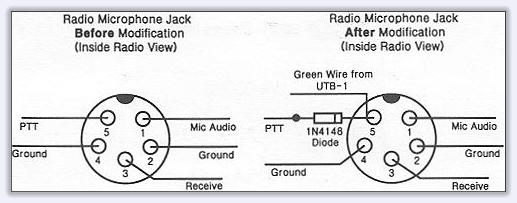
Typical Cobra/Uniden 5 Pin SSB Wiring
This talkback works well in radios that have none adjustable talkback too. The talkback in most radios is a
crude setup. What is done in the circuit is to eliminate the switching that occurs during transmission that
eliminates the RF modulating the audio amplifier via the supply voltage. Many of these radios do not have
an audio input to this amplifier; it’s just the RF and fluctuation of the supply voltage to that amp that causes
talkback. If you ever noticed on these radios that the talkback on sideband sounded like listening sideband
on AM, this is why. Also in these radios the talkback won’t work on FM. There is no fluctuation in supply
voltage during FM transmission. Some of the later radios that include an adjustable version apply the audio
through a potentiometer to the audio amplifier. These work better, however some still have the supply
voltage problem, resulting in low level distortion when the control is set low or off.
Typical Diagram Of Installation
The UTB-1 generates a clear version of talkback that in most cases works independent of the mic gain
control. There’s no need to reset the talkback every time the mic gain is adjusted. One trick to getting clean
audio talkback form this board is in the ground placement. Moving the black wire to different ground
locations produces better audio. This should be kept in mind when making an installation. Another tip, don’t
connect the shielded portion of the gray input cable. This will increase the instance of distortion. It can be
covered in shrink sleeve tubing or cut off.
Bob F

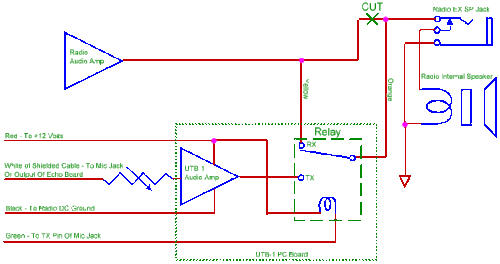

© CB World Informer Network 1996 - 2023 Worldwide Rights Reserved

September
2001 Web
Edition


- August 1996
- September 1996
- October 1996
- November 1996
- December 1996
- Review Of Midland 79-290 AM/SSB Mobile
- Cobra/Uniden SSB Chassis Mod UPDATE
- Clarifiers
- President Jackson Unlocked Clarifier Mod.
- Cobra 148 & Uniden GrantXL Clarifier Mod.
- Cobra 142GTL & Uniden Washington Clarifier
- Uniden Grant Unlocked Clarifier Mod.
- Uniden PCI22 PRO SSB Clarifier Mod.
- Review Of The Northstar DX880HL
- Big Bust At The Consumer Electronics Show
- Bob's CB Has Opened
- January 1997
- The New Mongoose Model 450 Review
- Wilson Antenna Tests The Trucker 5000
- A Company With Interference Solutions
- Solving Telephone RF Interference
- Lowpass Filters: What, Where, And How
- Using Highpass Filters For TVI
- How To Conduct A Noise Audit
- Modern Do-It-Yourself Grounding Techniques
- Using Water Pipes For RF Grounding
- Using Water Pipes For RF Grounding
- February 1997
- The New Emperor TS-3010 Review
- Bulkhead Grounding
- Grounding Coaxial Cable Shields
- Using Anti-Oxidants
- Modern Lightning Protection - RF Entry Ports
- Modern Lightning Protection - AC Power Lines
- Modern Lightning Protection - Control Lines
- Modern Lightning Arrestors - Polyphaser VS I.C.E.
- Modern Lightning Arrestors - Alpha Delta VS I.C.E.
- Modern Lightning Arrestors - Cushcraft VS I.C.E.


- July 2001
- Galaxy DX 2547 Reveiw
- Inside The DX 2547
- DX 2547 Channel Mod
- DX 2547 Clarifier Mod
- DX 2547 Photos
- DX 2547 Manual Excerpts
- The Anttron Story
- Anttron 305 Revisited
- New Antrron Products
- Aries A-SWR 460 Digital Meter
- Barjan Buys Wilson Antenna
- Wilson Electronic In Cell Phone Market
- First Web Issue
- Help Get The Word Out
- August 2001
- Sneak Preview: The New Maverick A24
- Maverick A24 Front Panel Controls
- Maverick Conversion
- Inside The Magnum Maverick A24
- Barjan Buys Francis Antenna
- Wilson Antenna, 1 Year After Barjan Buyout
- CBer Busted
- Astaic's MobileMax
- Solarcon I-Max 2000
- False Performance Claims
- CAUTION: Don't Burn Out That Radio
- Magnum's Filtered Power Cord
- Dragon Super Heavy Duty SO-239 Stud
- CBWI...Give Us Your Opinion
- September 2001
- Reveiw Of The RCI 2950DX
- RCI 2950DX Image Rejection Modification
- RCI 2950DX Coversion & Clarifier Mods
- RCI 2950DX Photos
- RCI 2950DX Board Component Layout
- RCI 2950DX Adjustment Layout
- RM-9807: Petition To Remove 155 Mile Limit
- Slip-Seat Radio Box
- RF Limited UTB-1 Adjustable Talkback Board
- A Message From The Editor
- October 2001
- November 2001
- December 2001
- January 2002
- February 2002
- July 2002
- June 2014

































